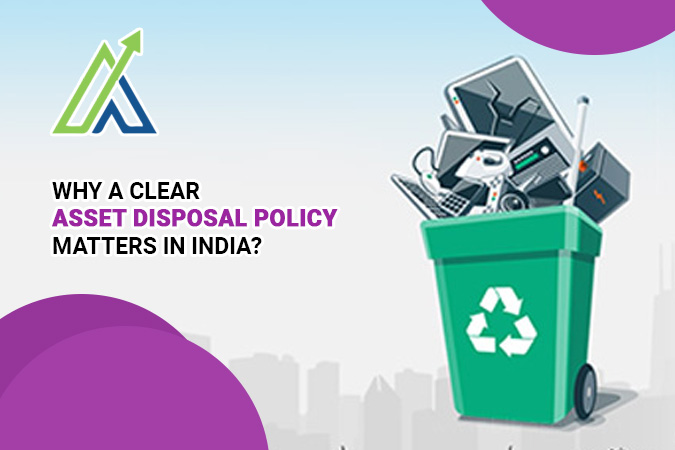In the hustle of India’s business world, managing assets isn’t just about acquiring and using them—knowing how to dispose of them matters too. Without a clear asset disposal policy, things can get messy. This blog dives into why you need a solid policy, covering procedures for approval, documentation, and reporting.
The Need for a Clear Policy
- Regulatory Compliance
India has strict rules for disposing of assets, especially electronics. You need to follow these to avoid legal trouble. The e-waste (Management) Rules, 2022 and the Ministry of Finance provide transparent suggestions to improve. Ignoring them can lead to fines and damage your reputation. - Financial Responsibility
Throwing away old assets isn’t just about clearing space; it’s about recouping value. Selling old machinery or computers as scrap can bring in cash that you can reinvest. This boosts financial efficiency. - Environmental Duty
India’s environmental laws are tough. Proper disposal of electronic waste is crucial. Partnering with certified e-waste recyclers helps handle waste responsibly and minimizes environmental impact.
Key Parts of an Asset Disposal Policy
- Approval Process
This sets who can approve the disposal. Maybe the finance manager handles assets under ₹1 lakh, while the board handles higher values. This keeps things organized and ensures that disposals are justified. - Documentation
Keep detailed records of every asset: its condition, value, and how you disposed of it. This transparency is essential. For instance, if you auction old computers, document the process and the sale price. - Reporting
Regular reports are crucial. They should list what was disposed of, how, and for how much. This is important for audits and compliance checks. It also helps in planning future asset management strategies.
Steps for Approval
A clear approval process ensures that every disposal is necessary and approved by the right people. Here’s a basic rundown:
- Initial Check: The department checks the asset’s condition and utility.
- Recommendation: They recommend disposal, usually with a cost-benefit analysis.
- Approval: The recommendation goes to the department head or finance manager for review.
- Final Sanction: For high-value items, senior management or the board gives the final nod.
For example, a university might need the science department head’s review before the procurement office disposes of old lab equipment.
Documentation
Proper documentation supports the disposal process. Key elements include:
- Asset Description: Details like manufacturer of the product, model, and serial number.
- Condition Report: Current condition and reasons for disposal.
- Valuation: Estimated value based on market analysis.
- Disposal Method: How the asset is disposed of—sale, auction, recycling, or donation.
- Transaction Records: Details of the transaction, including buyer information and financial receipts.
For example, when a company disposes of office furniture, it should document the sale through an internal auction, noting the bids and revenue generated.
Reporting
Consistent reporting is crucial. Reports should include:
- Summary of Disposals: List of all disposed assets.
- Financial Analysis: Details of revenue or costs from disposals.
- Compliance Check: Confirmation that disposals followed policy and regulations.
For instance, a manufacturing firm’s quarterly report might highlight the sale of outdated machinery, the income generated, and compliance with environmental regulations.
Questions to Understand your ability
Qus: Why is following asset disposal rules important in India?
- To boost sales
- To stay out of legal trouble and avoid fines
- To hire more staff
- To cut taxes
Qus: How can getting rid of old machines or computers help financially?
- Reduce workload
- Make the office look better
- Make money by selling them as scrap
- Increase company debts
Answer: c) Make money by selling them as scrap
Qus: Who usually approves asset disposals under ₹1 lakh?
- CEO
- Board of Directors
- Finance Manager
- HR Manager
Qus: What’s a key part of asset disposal records?
- Employee satisfaction surveys
- Reports on asset condition
- Marketing plans
- Social media updates
Qus: Why do you need regular reports in asset disposal?
- For social media engagement
- To keep up with rules and plan ahead
- To cut down on paperwork
- To boost production
Conclusion
The absence of a clear asset disposal policy can only be described as inadmissible because it compromises both the legal requirements of organizations and their sustainability and efficiency in terms of financial management and environmental stewardship. When control schemes are exercised with precision through detailed approval procedures, documentation, and reporting, it becomes easier to address the irresponsible use of assets and support essential economic and environmental agendas.
FAQ's
Follow the e-waste (Management) Rules, 2022, and guidelines from the Ministry of Finance to avoid trouble.

